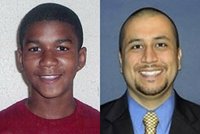
An American lynching?
By David Hoffman

Every so often, an incident occurs in America that demonstrates how the racial "progress" it boasts of is more illusory than real, and how the "knee-jerk" solutions proposed by self-serving lobbying groups, and promoted by equally self-serving politicians cynically trolling for votes, often cause more harm than good.
One could argue that the killing of Trayvon Martin by George Zimmerman in Sanford, Florida is such an incident. It certainly unleashed the profit-driven lust of America's corporate-controlled media, and underwent all the metamorphoses these media engender to promote controversy over truth.
Early-released photographs of Martin showed a smiling, baby-faced, African-American youth whose eyes sparkled with exuberance. By contrast, early-released photographs of Zimmerman depicted a sulking, scowling, sinister man. In addition, recordings of calls Zimmerman made to the police on the evening of the killing were altered by some of these media (intentionally or unintentionally) to imply that Zimmerman's shooting of Martin was fueled by racial animus.
But, once right-wing and racist commentators regained the stage, these depictions shifted. Martin was now at fault for "wearing a hoodie," and the injuries Zimmerman allegedly suffered during the incident were prominently displayed.
But buried within these media machinations are some disturbing questions. The first is one that many people, of all races, have asked: Would the police have responded in an identical manner if Martin had shot and killed Zimmerman? The second is, what is exactly meant by the "right to stand your ground?"
Despite its tourist-driven "come-hithers" as the "Sunshine State," Florida has a sordid history of injustices when it comes to its treatment of African-Americans-(for greater details, see Isabel Wilkerson's excellent article, Trayvon's Killing and Florida's Tragic Past)-so there was nothing illogical about assuming that Zimmerman had been given preferential treatment by the police.
Also, one of the primary concerns raised by critics of "stand your ground" laws is that the only ones capable of asserting them are those who are not dead. This was made abundantly clear after police refused to arrest Zimmerman because nobody could dispute his version of events.
But, as difficult as it may be to do, if one strips away all the emotions and political rantings, the only logical conclusion to be reached is that Trayvon Martin was indeed the victim of an unwarranted shooting and that George Zimmerman did indeed commit a crime.
Reasonable minds cannot dispute that both Martin and Zimmerman had every legal right to be where they were on the evening of the shooting. And it certainly never entered Martin's mind that a simple trip to the store would ultimately result in his death.
Plus, there is no doubt that Zimmerman is both the direct and proximate cause of Martin's death. He is the direct cause because he pulled the trigger on the weapon that killed Martin. But he is also the proximate cause because, had he not taken the actions that he did, Martin would still be alive.
First of all, Zimmerman had already reported his suspicions of Martin to the police; second, he was instructed not to confront Martin, yet did anyway; third, once Zimmerman confronted him, Martin had as much right to "stand his ground" as Zimmerman did.
In fact, under traditional self-defense law-which dictates that the degree of force one responds with must be proportionate to the attack-Martin was the only one acting lawfully. He was doing nothing illegal, yet was chased and ultimately confronted (some might even argue falsely imprisoned) by a man who was already convinced Martin was "up to no good." And even though nobody will ever know Martin's mindset at the time of this confrontation, there can be little doubt that he perceived Zimmerman's intentions towards him to be anything but friendly.
And the "injuries" Zimmerman allegedly sustained are irrelevant, because he, and he alone, was responsible for them. Had Zimmerman listened to the police and not confronted Martin, he never would have been in a position to be injured by him.
The fact that Martin apparently got the upper hand during this confrontation still gave Zimmerman absolutely no justification for shooting him. Martin neither displayed nor used a weapon, which made Zimmerman's actions clearly disproportionate to the situation.
In addition, even most advocates of "stand your ground" laws agree that aggressors cannot instigate physical confrontations or violent incidents, then kill an innocent person they've provoked because they start losing the fight. To allow such a defense would be to allow every barroom brawling bully in America to shoot or stab any victim he fails to best in unarmed combat.
Crime is indeed a problem in America, and many people are indeed becoming disillusioned with the ability of America's legal system to effectively prevent it. But even Charles Bronson, in his famous (or infamous) Death Wish movies, at least waited until it was clear a crime had been, or was being, committed before he pulled the trigger.
Sadly, given the sordid, racist history of Florida, and indeed many towns, cities and states throughout America, the outcome of the Zimmerman trial is probably preordained. An all-white jury will blame Martin for having the "audacity" to be an African-American teenager wearing a hoodie and walking through a gated community.
These jurors, on the other hand, will view Zimmerman as the faithful "community" watchdog, the personification of America's frustration with crime, the man doing the job that the "authorities" are unwilling, or unable, to do.
And Trayvon Martin's name will be added to the ever-growing list of African-Americans who, both as crime victims and as wrongfully convicted innocents, were lynched by America's intransigently racist legal system.
David R. Hoffman
Legal Editor of Pravda.Ru